How many people live in the United States? That’s what the 2020 census will determine, and the Commonwealth of Pennsylvania is gearing up for the April 1 count.
While counting the population of Pennsylvania sounds like a simple proposition, the task is actually pretty difficult — especially when people may not understand why the census is so important and why it applies to absolutely everyone.
For example, in a state like ours with a high immigrant population, there can be misconceptions about the count.
“We must count everyone independent of their immigration status in Pennsylvania,” insists Norman Bristol Colón, executive director of the Governor’s Census 2020 Complete Count Commission. “When the Constitution says that we must count everyone, it is everyone.”
Created by the governor’s executive order under the umbrella of the PA Department of Community and Economic Development, the Commission is a non-partisan body made up of 43 members representing organizations from all over the state. And they’re serious about the job. Colón warns that an undercount would have “very negative repercussions” for Pennsylvania across the board.
Many critical resources hinge on the number of people in the Commonwealth, such as federal allocations for 16 vital programs including SNAP and Medicaid. In fiscal year 2015, for example, Pennsylvania received $26.79 billion dollars in federal grants from these 16 programs. The Commission estimates that the state could lose $2,093 in federal funding per uncounted person per year for the next 10 years.
And there’s also representation in Congress. Pennsylvania currently has 18 congressional districts, and if the census fails to properly count the current population, Pennsylvania could lose up to two congressional seats, reducing our state’s voice in the federal government.
When the Constitution says that we must count everyone, it is everyone.Norman Bristol Colón
Part of the reason the Commission exists is that some folks are harder to count than others. These include kids, racial and ethnic minorities, people who are homeless, undocumented immigrants, and college students. Commission members from a wide range of institutions, including nonprofits, religious entities, local governments, schools, and businesses, work hard to make sure the census reaches everyone.
When Colón spoke with Keystone Edge, he was in the car, heading home from a church that opens a food bank every Wednesday. Outreach at sites like that is crucial for reaching homeless Pennsylvania residents, he says.
In his role with the Commission, Colón has found that homeless individuals in cities like Lancaster place their greatest trust in local pastors. Places of worship become important hubs for spreading information about when, where, and how all people can respond. When it comes to the census, it doesn’t matter whether you have a home or not, and your residency status doesn’t matter either.
“If you are a U.S. citizen, a refugee, an undocumented immigrant,” or even if you’ve only just arrived in Pennsylvania, “we must count you here,” explains Colón.
The Commission understands that some people could be fearful of sharing their information with census workers, but there is no risk in participating.
“It is important for people to know that it is simple, it is easy, it is safe, it is confidential,” he says. “The individuals working with the census will not share that information with anyone.”
That kind of awareness campaign — plus freely distributed materials like brochures and posters — costs money. The Commission originally recommended a state budget allocation of $12.8 million to support its outreach (just $1 per resident, as of the last count). Ultimately, it ended up with $4 million to carry out its work. Compared with a $200 million allocation in California and an $8 million allocation in Maryland for similar work, that’s a tight budget.
“It’s not what we asked for, but we are grateful to have it,” says Colón. “We’re going to do whatever we can to spend the taxpayers’ dollars responsibility, and at the end of the day, have a complete and accurate count.”
Colón encourages everyone to visit pa.gov/census for information about responding on April 1, 2020.
Lead image: Director Barry L. Denk, Center for Rural Pennsylvania, speaking in the Pennsylvania Capitol Rotunda. Officials from the Wolf Administration joined state officials, stakeholders, and others at a Capitol rally to urge Pennsylvanians to participate in the 2020 U.S. Census
ALAINA JOHNS is a Philadelphia-based freelance writer and the Editor-in-Chief of BroadStreetReview.com, Philly’s hub for arts, culture and commentary. You can visit her at her blog, where fiction need not apply.



